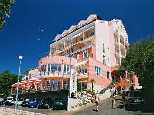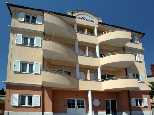|
|
Nostalgic cruises on the Motor Sailer M/S “Vila” |
M/S “Vila” is a two mast Motor Sailer, 20m in length, built in 1930, fully renovated in 1980, and has a 169 HP motor. This Motor Sailer offers 16 bunks in 8 twin-bed cabins situated below deck, each with bunk bed, safe, washbasin and porthole. The vessel is equipped with 3 communal showers/toilets, large sundeck (70m˛), table and benches on deck, a comfortable salon, as well as the possibility of free internet access. A 220 V generator ensures sufficient supplies of electricity.
M/S “Vila” is the ideal vessel for small groups or several families. Ship owner Josko Kordic, a young Captain from Supetarska Draga on Rab Island, truly knows each and every island, the tiniest peninsula and the most hidden bay.
The secret of M/S “Vila” The carefully restored two mast Motor Sailer “Vila” has already been in the family’s possession for two generations. She will take you through the land of a 1000 islands, sun and sea. As soon as you set foot on the deck of the “Vila”, you shall sense an air of reminiscence and piracy.
Attention is focussed towards socialising in a pleasant atmosphere while on board. Originally furnished lounge and an excellent menu of traditional specialties (compliments of the ship’s chef), sun rises and anchorage in picturesque bays, tours of ancient towns and evening strolls along beautiful harbour promenades, will make this holiday unforgettable.
Possibility of embarking in Rijeka, Krk or Rab. Charter tours can be arranged and modified to taste. Reservation is possible only from Saturday to Saturday. Minimum number of participants is 9 and maximum number is 16 persons.
|
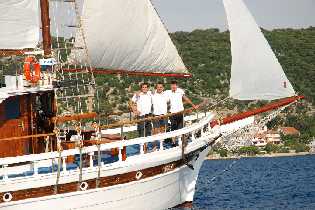
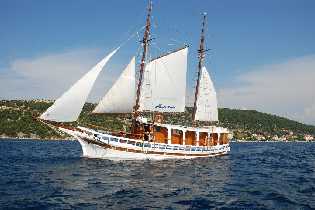
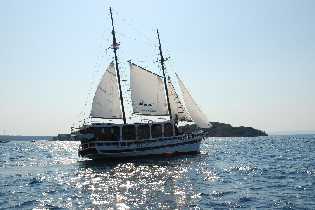
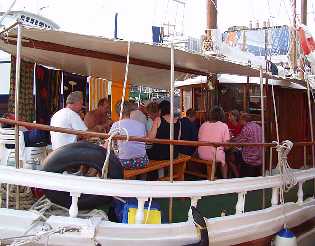 |
|
Croatian cruises – motor sailer M/S “Vila”
Rijeka
Krk Town on the island of Krk
Punat on Krk Island
Rab Town on the island of Rab
Sali on Dugi otok Island
“Telascica” Nature Park on Dugi otok Island
Proversa – shallow channel between Dugi otok Island and Katina Island
Mana Island – “Kornati” National Park
Scenes from the film “As the Sea Rages“ with Mario Schell
“Kornati” National Park
Mali Losinj on Losinj Island
Dolphins near Losinj
Cres Town on the island of Cres
Discounts/other:
- Sojourn and port charges not included in price (€21.00 weekly per person, €10.00 per child to 11.99 years paid upon boarding)
- 1 adult + 1 child to 13.99 years in 1 cabin: - 30 %
- 2 adults + 2 children to 13.99 years in 2 cabins: - 30 %
- Cabin for one person: + 50%
- Registration fee: 3.50 €/person
EUR prices are rounded and correspond with exchange rate of 1 €=7.60 Kuna
and are subject to change depending on market value. Effective exchange
rate on day of payment is applied.
Saturday: Boarding from 11:30 am to 01:00 pm in the port in Rijeka. Word of welcome and familiarisation with the crew and other passengers. After the introduction we lift anchor and head towards Krk Island. We sail into one of Krk Island’s coves where we shall have our first swim in the Adriatic Sea. We then head onward to the Krk city, the main town on the island, or towards Punat, where we shall spend the night.
Sunday: After breakfast, we head off towards our next island - Rab. After sailing for about two hours, we shall anchor in a romantic cove where there will be plenty of time for swimming and sunbathing. In the evening we shall arrive in the city of Rab. The historical nucleus of Rab, recognizable by its bell towers, stretches out on a narrow and rocky peninsula, surrounded by the sea. Three crossing streets intersect the town: the lower street with its cafes and taverns, the middle street with its boutiques, souvenir shops and ice cream parlours, and the upper street that leads to the churches with the four bell towers.
Monday: We head south. Today’s destination is Sali, the largest township Dugi Otok island. Dugi Otok, or “Large Island” in English, is rightfully named as such, because it is 45 km long and only a few hundred meters wide. Most of the residents of this island live and work in Zadar, so on weekdays the island’s towns are extremely quiet while on weekends the “urban families” return to spend time in their hometown. Before we reach the port in Sali, we shall naturally anchor in one of the coves and take a swimming break.
Tuesday: This will certainly be the climax of our trip: “On the last day of Creation, God decided to crown His work, and thus created the Kornati Islands out of tears, stars and breath” wrote Irish writer George Bernard Shaw (who in 1925 received the Nobel Prize for literature). Breathtaking natural landscapes, numerous small and large islands (the old folk saying goes: One island for every day of the year) and the magnificent sea make the Kornati Islands a unique paradise. They are the largest island cluster in the Adriatic Sea, numbering 147 islands, islets and reefs, with a total land area of 69 km˛, distributed over 230 km˛. Over 35 km in length and 13 km in width, the Kornati Islands are situated between Dugi otok Island in the northwest, Zirje and Pasman in the southeast and Vrgada and Murter in the north and northeast. From the port in Sali we shall set our course for “Proversa”, a narrow passage between Dugi Otok and the Katina Islands which, as a matter of fact, is also the entrance to the Kornati National Park. We shall sail past by an endless number of mostly uninhabited islets, and then we shall reach Mana Island - one side of the island gently submerges into the sea, while the other side dramatically rises out of the sea in the form of rocky cliffs. The ruins on the highest part of the island are not historical ruins, but props leftover from the movie “As the sea rages” (late 1950’s), with Maria Schell playing the part of a little girl named “Mana”. In the afternoon we shall head north once again and spend the night in one of the fishing towns of the Zadar archipelago - Dragove, Zverinac, Ist or Molat.
Wednesday: Today we head towards the island of Losinj, which is not only known for 300 days of sunshine a year, but also for the fact that it is covered in pine forests. With a little luck, we may be able to watch dolphins at play. The German-Croatian dolphin protection society “Adria Dolphin Project” has registered up to 220 dolphins. After taking a swimming break, we shall arrive in Mali Losinj and spend the evening as well as the night in the port.
Thursday: Today we shall set sail for the neighbouring island of Cres, connected to Losinj Island by a bascule bridge. Recognizable features of Cres Island are the endless plantations of olive groves and flocks of sheep. It is with good reason that lamb is one of Cres’s specialties. After a swimming break, which goes without saying, we shall head towards the picturesque town of Cres where we shall spend the night.
Friday: Today we shall bid farewell to the Croatian islands and sail from Cres along the eastern coastline of Istria towards Rijeka –without, however, missing an opportunity to go for another swim. We shall spend the night in Rijeka.
Saturday: After breakfast we shall disembark around 9:00 am.
Cruising on a wooden sailing ship: M/S "Vila" is a wooden motor-sailer built in the traditional way. All information and data refer to the situation in September 2009 - annual winter servicing and modifications may result in certain structural changes, thereby somewhat changing the appearance and description of the vessel. Motor-sailer M/S Vila is more than 80 years old, this, however, only applies to the name and hull shape. Within the framework of reconstruction and regular maintenance, all planks, screws and nails are replaced. Cruising on a classic wooden sailboat is not comparable and has nothing in common with cruising on a large cruiser - here you will enjoy yourself without major formalities, always in good spirited company, without suits and ties.
Cabins: average cabin size is 4-6 m². Cabins offer enough space for sleeping as well as for storage of a travel bag. Cabins are appropriately furnished, each with two beds and a small cabinet or open shelves. Beds are arranged one above the other (bunk beds, mostly without a ladder). Cabins are situated below deck and have a porthole for ventilation, and a washbasin. Cabins are generally billeted out in order of reservation. Beds are covered with clean linens upon your arrival. Please bring your own towels. Since the crew do not enter cabins during the tour, it is the responsibility of guests to keep cabins clean. Shared showers and toilets are regularly maintained during the course of the trip. The crew have their own cabins which are not mentioned in the description.
Air conditioning: the vessel is fitted with air-conditioning in the hallway bellow deck. Cabins can be cooled only by leaving cabin doors open and portholes closed. Air conditioning is usually turned on only when the ship's motor or generator is running, or if the ship is connected to an electrical power supply while on dock. During overnight stays in isolated bays or small fishing villages without connections to a land based electrical power supply, air conditioning is turned off in order to provide for a peaceful night, which would otherwise be disrupted if the ship's motor or generator was left running.
Clothing and luggage: evening gowns and tuxedos should be left at home! Casual clothing such as shorts, T-shirts and bathing wear are much more appropriate. For chilly evenings (particularly in the shoulder season), we recommend a somewhat warmer pullover or long sleeve attire, and a raincoat would not go amiss on the odd occasion. Since cabin space is limited, it is better to take along a soft travel bag or back pack instead of a hard suitcase. Although the ship is always supervised by at least one crew-member while at dock and each cabin has a safe, valuable items which are not absolutely necessary are better left at home.
Meals: meals are compatible with local tradition. Breakfast consists of coffee or tea, white bread, butter and marmalade or cold cuts. Main meals (lunch and/or dinner) are traditionally calorific and abundant, mostly consisting of soups, meat or fish, served with side dishes and salads. Although fish will be served quite often (considering that we are talking about a sea trip!), main meals mostly consist of meat. Optionally available is a vegetarian diet (this should be mentioned when booking). A vegetarian option does not necessarily mean that a special menu will be prepared. Instead of meat, more side dishes will be offered (salads and vegetables). Preparation of special dietary food is usually not possible. Meals on board are typically half pension, generally consisting of breakfast and lunch. Dinner can be found in a numerous number of restaurants located in ports where we will be spending the nights. Occasionally, or by agreement (such as when spending the night in an isolated bay), dinner is prepared on board and paid directly by participants (approx. € 7 - € 25 per person per meal, depending on type of food served). Offer of half board begins with dinner on the day of embarkation and ends with breakfast on the day of disembarkation. Full board consists of breakfast, lunch and dinner, and can only be arranged as a package arrangement for all participants on any particular trip.
Beverages: the salon doubles up as a restaurant, lounge and bar. Here you can obtain cold alcoholic and non-alcoholic beverages at all times. Typically, beverage consumption is tabbed and billed at the end of the journey. Beverages are off course somewhat more expensive than in stores, but please be aware that you are staying in a small floating pension. Prices are, however, slighter than in hotels, and can be compared with prices in cafes and restaurants. For example, 0,5 L mineral water, soft drink or beer is around € 2, while a bottle of wine starts at € 8. Beverages and food (with the exception of fruit or biscuits) cannot be brought on board.
Embarkation: boarding in Rijeka Port normally takes place between 11:30 am and 1:00 pm., so that the crew can prepare the vessel without disruption. If you arrive early, you can leave your luggage onboard and then take a walk through the city, go shopping, dine, or enjoy a coffee on one of the many seaside appealing. As soon as all guests are onboard, we raise anchor and set sail. Guests who arrive late or guests for whom Krk or Rab island present more convenient transport links, will join us there in the afternoon or evening hours.
Disembarkation: disembarkation normally takes place by 9.00 am on the last day. The crew needs time between disembarkation and boarding in order to clean up and return cabins to the way they were when you found them a week or two earlier.
Luggage storage: if you are planning to continue your trip on the mainland once the cruise is over, it is unlikely that you will be taking all of your luggage on board. You can leave your luggage in the left luggage office in the Rijeka bus terminal, located approximately 300 m from the harbour, at a price of about €1.50 for each individual piece of luggage per day. Luggage can also be stored in our agency in Rab at a rate of €10.00 per week for each piece of luggage.
Car parking: in Rijeka, garage parking is available at 360 Kuna (approx. € 50) per week. Private parking is available in Rab at 300 Kuna (approx. € 40) per week. Parking is under surveillance but is not insured.
Water and electrical power: electrical power and water are available on board, but are limited. The motor-sailer is equipped with a 220 V generator, which during night time must be turned off because of the noise it generates. In essence, it would be quite inadequate listening to a noisy engine or generator while anchored in a peaceful bay. Please take care when utilizing large power consuming appliances such as hair dryers. Usage of several hairdryers at the same time could cause an electrical overload and can lead to temporary power failure. Water reservoirs are large enough to ensure sufficient water supply for showering and washing, even when reservoirs cannot be refilled over a period of several days. This, off course, is based on the assumption that travelers will consume water in reasonable amounts. Hot water for showering is centrally heated and is available in sufficient amounts for all if consumed wisely (e.g. by turning off water between soaping up).
Environmental care: in the interests of environmental protection, it is strictly forbidden to through waste material into the sea or into the toilet. The wooden-sailer is equipped with a sufficient number of garbage bins in order to ensure appropriate garbage disposal.
Sleeping on deck: many guests consider that spending the night under the twinkling, fresh air Mediterranean sky, to be a unique experience. There is, off course, plenty of space for this on deck, but you must bring your own sleeping bag and underlay sponge or beach mattress, because it is forbidden to carry mattresses and blankets from the cabins on to the deck.
Night-time curfew: considering that vessels are not sound proofed and quite often several vessels are tied close to each other, mutual understanding and consideration is emphasised. Nights are usually spent in larger city ports, which happen to be centers of local activity. During the summer, nightlife in Mediterranean countries generally takes place in the open (restaurants, cafes, guest houses, terraces), often providing for lively evenings and nights. Therefore, please bear this rule in mind: those of you who cannot sleep, join the celebrations without delay!
Music and entertainment: music and entertainment are not a rarity on board – with parties occurring spontaneously more often than not. Therefore, If someone has, for example, a guitar or accordion, then don't hesitate to take it along for the ride.
Routes: routes are planned so that daily goals can be met comfortably, considering normal weather conditions. It is within the Captain's jurisdiction to change any given route depending on weather and port conditions, including whether or not to extend or shorten time spent in particular ports. Presented routes serve as examples, and may be altered due to safety reasons.
Ship charter: all onboard participants are obliged to reserve half-pension when chartering motor-sailer M/S Vila. Combination of half and full pension within a particular charter group is not possible. Surcharge for half pension is € 20, while children up to age 13.99 are charged € 10. Surcharge for full pension is € 29, or € 14 for children up to age 13.99. Total cost calculation is based on a minimum number of 13 participants. Routes within Croatian territorial waters can be negotiated with each particular charter group. The average daily duration of voyages is about five hours (that is, 35 hours per week, but not more than 7 hours in any given day). In case the average daily trip duration is exceeded, a surcharge for additional fuel consumption will be paid to the captain.
Ship spaces: cruising on a motor sailer is definitely a unique experience. Minor traps found in ships, however, should be taken into account: stairs are narrower and steeper than the ones you might have at home, the deck can be quite slippery after a storm or morning due, or you could stumble over a number of things found on ships. Because wood is a breathing material that contracts during high summer temperatures, you may find water in your cabin after rain or bad weather. In any case, portals in cabins must be shut in the event of bad weather. Sea vessels are often tied next to each other as ports can become quite crowded during the high season. Therefore, much care must be taken when traversing from one vessel to another or when descending from a vessel, bearing in mind the varying height difference of ship decks. Particular caution is required when anchoring in a bay where swimming is anticipated. Special care must be taken when taking that "bold leap off the deck" and into the refreshing sea. On the one hand you must be careful not to injure yourself during the dive, and on the other, you must be of aware of the potential danger for other guests who can quite easily slip when you exit the sea and board the deck.
Children on board: whatever the case, a cruise presents a great experience for children. Because of special circumstances onboard a motor sailer, however, cruises are recommended only for children of school age who know how to swim. Children will discover something new every day, for example: the many switches and levers in the helm, lifting sails or lowering anchors. Given the possibility of potential accidents, appropriate precautions must be taken and parental supervision is mandatory at all times.
Sailing: ships are generally run on motor engines in order to keep to the planned itinerary. Nevertheless, sails are raised at least once a week if prevailing winds are suitable and if time permits.
Fishing: the Adriatic Sea is rich in fish and is therefore ideal for fishing. You are permitted to bring fishing gear onboard in order to fish from the ship or from the shore. In this case, a fishing license is mandatory and can be obtained in tourist agencies or from the Harbour Master's Office. A certain fee applies, however.
Payments onboard: the cost of drinks and additional services will be payable in local currency (in kuna) or in Euros. Other currency and credit cards are not accepted. Sojourn tax and harbour fees (embarkation / disembarkation taxes) are not included in the price. A total of € 21 weekly per adult (€ 10 for children) is payable upon embarkation. Entrance fees to museums or national parks, additional trips etc. are to be paid on the spot.
Minimum number of cruise participants: our cruises depend on a minimum number of nine (9) participants in order to realise any given trip. Should we suspect that the minimal number of participants will not be reached, we will advise you no later than 21 days prior to departure.
|
|
|
|
|
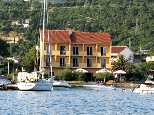 Hotel Tamaris – Rab Island/Palit
HOTEL-PENSION "TAMARIS" *** - ideally located right beside the sea and on the edge of Komrcar Park
further information and details… Hotels Rab Island and rest of Croatia
Hotel Tamaris – Rab Island/Palit
HOTEL-PENSION "TAMARIS" *** - ideally located right beside the sea and on the edge of Komrcar Park
further information and details… Hotels Rab Island and rest of Croatia


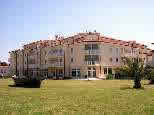 Hotel "Arcus Residence", three star rating ***, is located in the most
southern part of the Istrian Peninsula, in the heart of the renowned
Medulin holidays resort. Hotel "Arcus Residence" is located in a
tranquil setting immediately by the seaside. The seaside promenade, by
which the hotel is sited, leads to the nearby town centre and is
appropriate for romantic strolls, skating and recreational bike riding.
Numerous sporting, recreational and wellness opportunities can be found
in the immediate vicinity as well as within the hotel itself
Hotel "Arcus Residence", three star rating ***, is located in the most
southern part of the Istrian Peninsula, in the heart of the renowned
Medulin holidays resort. Hotel "Arcus Residence" is located in a
tranquil setting immediately by the seaside. The seaside promenade, by
which the hotel is sited, leads to the nearby town centre and is
appropriate for romantic strolls, skating and recreational bike riding.
Numerous sporting, recreational and wellness opportunities can be found
in the immediate vicinity as well as within the hotel itself
